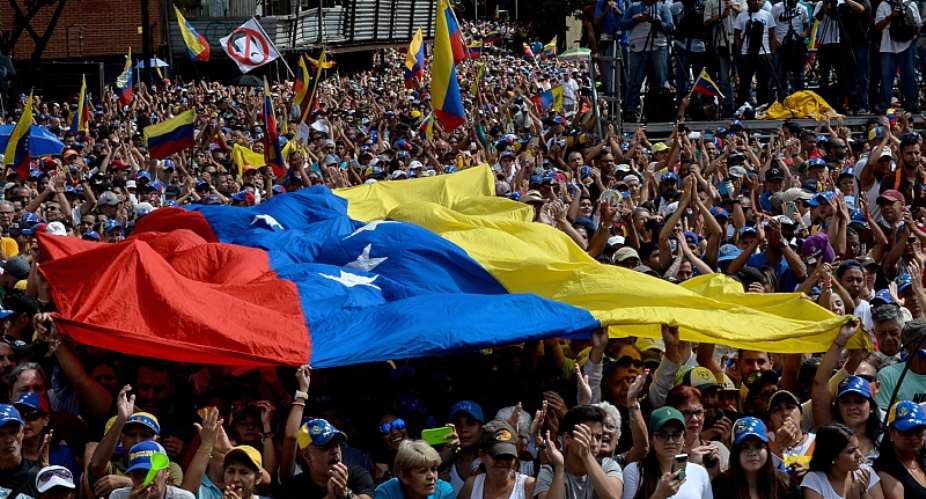The political crisis in Venezuela has reached a centre stage where the two leading factions need to come together to work on the interests of the country, to give peace to upcoming generation and to discuss possible ways by which the country could develop as a leading oil nation. No doubt, if the country gets a sound footing, it would ruffle shoulders with Saudi Arabia who are on records, to have effectively and efficiently managed their oil resources.
It is estimated that Venezuela possesses the world’s largest oil reserves, about 300 mln barrels (not sourced), which is approximately 4 times as much as Russia and 7 times more than the USA. As once Latin American richest nation, oil is the main source of revenue to the government, and a slip in proper and efficient management of same is a national catastrophe for the economy.
However, it would be very difficult for the Opposition Leader, a self-declared interim president, Juan Guaidó, to actually topple Nicolás Maduro as president of Venezuela. My opinion rests on the shoulders of the underpinned factors.
In the first place, the structure of Venezuelan government rests on the premises of the military. The country’s military holds important positions within the government. Key positions such as Food Distribution Services, Defence Ministry, Interior Ministry, television channels, a bank, Construction Group, military mining, gas and petroleum company as well as Head of National Guard. These key positions constitute the bedrock under which the country is governed and for so to speak, the military might not see anything wrong with the governance of the country as they are deeply rooted in the day-to-day operations of the country. So for someone or opposition leader to accuse the president of mismanagement of the country’s resources is an indirect attack on the military who constitutes the government.
In 2017, records show that out of 32 cabinet positions, 10 were held by active-duty military men and two held by retired military personnel. These positions under the headship of the military constitute the core-fabrics of the Venezuelan government. Unlike other countries where the military is situated at the barracks whiles given expert advice(s) to the Defence Minister, the Venezuelan case is a complete opposite example to what we are used to. The motive behind this governance system emanates from Hugo Chávez, late former president, who was a military man by profession. His reason behind putting out the military from the barracks onto the public limelight was to create a working environment where civilians/citizens would see the military as friends and partners to development rather than the usual mindset of the military being a symbol to be scared-off.
It would be interesting to note that during the Cold War, the Venezuelan military was a strong U.S. ally and a major client for arms and aircraft, including F-16 fighter jets. But former President Hugo Chávez, a former army paratrooper who first came to prominence after leading a failed coup attempt, began revamping the armed forces after ushering in Venezuela's socialist revolution in 1999.
Chávez broke with the Pentagon and brought in Cuban military advisers. He based promotions on loyalty to the revolution. And he gave vast new powers to his favorite officers, a trend that has accelerated under Maduro as he tries to keep the military on board amid the deepening crisis. The action of Chávez has caused deep-rooted international brouhaha between his appointed successor, Maduro, and the Pentagons till date.
One major factor that must be critically looked at which destructs the ambitious move by Juan Guaidó to topple Nicolás Maduro is how the highest ranks held by the military would see themselves. The military personnel who are at the highest ranks in the government won’t see themselves as part of any transitional government. For this reason, why would they contribute to toppling a president who has a full recognition of their roles!
The military in Venezuela has often served as ultimate power broker in the country. I want to state for emphasis that per the political-military arrangement of Venezuelan government, the opposition won’t be able to overthrow the president.





 Akufo-Addo commissions Phase II of Kaleo solar power plant
Akufo-Addo commissions Phase II of Kaleo solar power plant
 NDC panics over Bawumia’s visit to Pope Francis
NDC panics over Bawumia’s visit to Pope Francis
 EC blasts Mahama over “false” claims on recruitment of Returning Officers
EC blasts Mahama over “false” claims on recruitment of Returning Officers
 Lands Minister gives ultimatum to Future Global Resources to revamp Prestea/Bogo...
Lands Minister gives ultimatum to Future Global Resources to revamp Prestea/Bogo...
 Wa Naa appeals to Akufo-Addo to audit state lands in Wa
Wa Naa appeals to Akufo-Addo to audit state lands in Wa
 Prof Opoku-Agyemang misunderstood Bawumia’s ‘driver mate’ analogy – Miracles Abo...
Prof Opoku-Agyemang misunderstood Bawumia’s ‘driver mate’ analogy – Miracles Abo...
 EU confident Ghana will not sign Anti-LGBTQI Bill
EU confident Ghana will not sign Anti-LGBTQI Bill
 Suspend implementation of Planting for Food and Jobs for 2024 - Stakeholders
Suspend implementation of Planting for Food and Jobs for 2024 - Stakeholders
 Tema West Municipal Assembly gets Ghana's First Female Aircraft Marshaller as ne...
Tema West Municipal Assembly gets Ghana's First Female Aircraft Marshaller as ne...
 Dumsor is affecting us double, release timetable – Disability Federation to ECG
Dumsor is affecting us double, release timetable – Disability Federation to ECG
